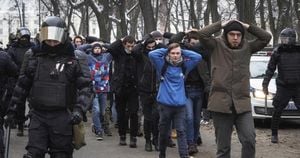Israel's political environment is once again erupting with tension following Defense Minister Israel Katz's recent announcement to halt the use of administrative detention against Jewish settlers accused of violence against Palestinians. This controversial decision has ignited significant backlash both within Israel and internationally, particularly as the country continues to navigate the precarious situation of security and civil rights for both Jewish settlers and Palestinians living in the West Bank.
Katz's action is perceived as part of broader right-wing populist strategies within the Israeli government, which has been criticized for straying from democratic principles. Administrative detention allows for the detention of individuals without trial, often based solely on intelligence reports. While this measure has predominantly targeted Palestinians, Katz’s decision now signals to settlers they will not face the same restrictive measures. "This decision reinforces the perception of apartheid—different laws for Jews and Palestinians," noted many critics, emphasizing the discriminatory nature of such legal disparities.
Former Chief of Staff of the Israel Defense Forces (IDF), Gadi Eisenkot, voiced alarm over Katz's decision, warning it could spark unrest throughout the West Bank. Notably, recent incidents have revealed rising tensions; during confrontations, settlers have assailed IDF commanders, underscoring fears of increased settler violence resulting from Katz's assertion of exemption from administrative detention laws.
The decision is partly rooted in the government's claim of needing to protect Jewish communities from rising Palestinian terrorism, particularly actors within locations like Jenin and Nablus, regions historically active for hostile operations against Israeli citizens. Katz emphasized, "It is not appropriate for the State of Israel to take such severe steps against our own citizens when they are under threat from terrorist activities." This rationale raises eyebrows, as critics argue it only entrenches violence by settling legal protections for Jewish criminals engaging against Palestinian communities.
Compounding the situation, there have been inflated incidents of violence reported against Palestinians by settlers—over 1,000 reported violent acts since October 2023, including unjustified torching of vehicles and attacks on individuals. With this backdrop, aid organizations and human rights watchdogs have increasingly called for accountability and sanctions against those perpetrated these violent acts.
Internationally, Katz’s decision has drawn scrutiny from the United States. State Department spokesperson Matthew Miller articulated the Biden administration’s concerns, stating, “We are incredibly concerned about the increase of violence by settlers.” The administration has called for stronger Israeli actions to deter extremist violence, noting actions undertaken against Jewish extremists are inadequate, particularly when juxtaposed against the extensive administrative detentions of Palestinians.
This situation creates complex dynamics for Israel’s relations with its allies. The Biden administration, though it has historically supported Israel, has leaned toward sanctioning and reprimanding those it perceives as fostering extremist sentiment and violence. The recent application of sanctions against individuals linked to settler violence suggests both the U.S. and allies like Australia are firming up their stance against growing extremisms on the ground.
Critics inside Israel caution this decision could lead to major backlash not just from the international community but could destabilize internal civil order. Professor Barak Medina from the Hebrew University of Jerusalem highlighted, “Administering laws should never be based on extraneous policies; every individual should be subject to the same regulations, regardless of their ethnicity.” This assertion emphasizes the expectation under international humanitarian law, raising alarms over the potential illegality of Katz’s decree.
Meanwhile, the change is seen as pandering to far-right elements within the Knesset, who assert the previous use of administrative detention against settlers was discriminatory. Both Internal Security Minister Itamar Ben-Gvir and Finance Minister Bezalel Smotrich praised Katz’s decision, framing it as the end of unjust measures against settlers, who they argue have been mistreated by their government.
Despite the vocal support from far-right members, many within the IDF and even moderates view the move as dangerous and detrimental to public security. Eisenkot stated this could diminish the military’s standing as the responsible authority for maintaining order and peace within the territory. “We must differentiate between law-abiding citizens and those who commit extremist acts,” he emphasized.
Given the current climate, where both sides harbor deep-seated grievances, Katz's decision will likely exacerbate long-running tensions. Settler violence seems poised to escalate without deterrents—placing not just Palestinians at risk but also fueling growing instability for Jewish residents who oppose extremist violence. International sanctions introduced amid Katz's announcement are seen as attempts to leverage the impacted situation.
With the right-wing government firmly entrenched and the possibility of sanctions looming, the future of peace and stability between Palestinians and Israeli settlers is uncertain at best. Many observers now wonder what steps the Israeli government will take next to address settler violence and how the dynamic may shift as upcoming elections may shake up the current governing policies. The need for prudent governance is urgent; as it stands, the balance between security and civil liberties appears more fragile than ever.
What lies ahead remains to be seen. Will larger international pressures lead Israel to reconsider its path forward, or will Katz's decree simply embolden the very tensions it seeks to tamp down?



